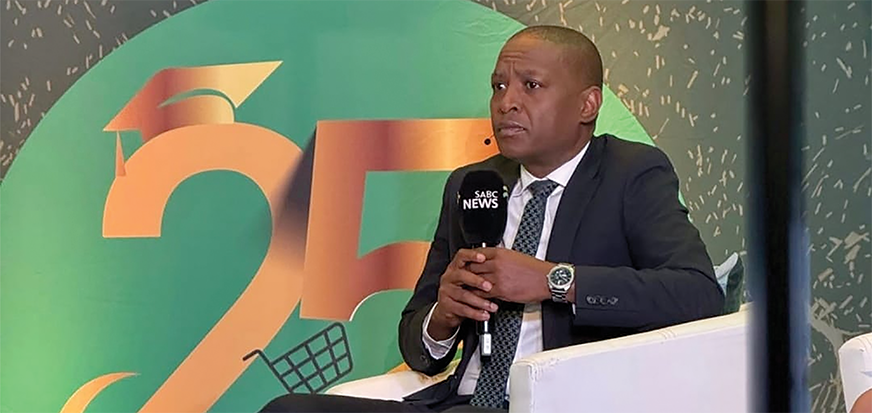VISION: Seta programmes are the foundation for economic growth and hope…
By Tom Mkhwanazi
In 2000, the Wholesale and Retail Sector Education and Training Authority, better known as the W&RSETA, opened its doors with a blank page. Unlike many other SETAs, we had no industry training board to inherit. No qualifications were registered. No systems were in place. We had to start from scratch.
Twenty-five years later, I reflect with pride on how far we have come but also with humility in recognising that the journey was never easy. We have faced difficult moments, some of which drew public criticism, particularly in the period between 2015 and 2019 when governance and performance fell short of expectations. These criticisms were not without basis and they forced us to change.
Today, the W&RSETA is not the same institution it was then. We are leaner, more accountable and, most importantly, more impactful. In the most recent financial year (2023/24), we achieved 91% of the performance targets set out in our Annual Performance Plan. That is not just a number on a report – it represents real opportunities for South Africans who need them most.
A question I often hear is: “Why do we need SETAs when we already have universities and TVET colleges?” The answer is simple. SETAs are not meant to replace universities. We exist to bridge the gap between learning and working. Universities produce graduates with degrees. SETAs produce skilled workers, entrepreneurs and managers who can immediately contribute to the economy.
In the wholesale and retail sector, which employs more than one in every five South Africans in the formal economy, workplace skills are the lifeblood of productivity and service delivery. A university alone cannot train a store manager, a supply chain supervisor, a merchandiser or an informal trader. That is the unique role of W&RSETA.
Over the past 25 years, the W&RSETA has:
• Funded thousands of learners across short skills programmes, learnerships, internships and bursaries. In 2023/24 alone, tens of thousands of unemployed youth were supported.
• Reached over 3 500 registered SMMEs and over 3 400 informal traders with training and workshops, helping them to grow their businesses.
• Ensured gender inclusivity, with women making up the majority in several learning programmes, in some cases above 60%.
• Supported higher education bursaries for thousands of students in wholesale and retail-related qualifications, many of whom would otherwise not have had access to study. Some bursary recipients have gone on to postgraduate study and leadership positions in the sector.
• Created career pathways for young people through our Career Guidance Strategy, which provides information and tools to help them see wholesale and retail as a career of choice rather than a last resort.
One of the proudest outcomes is that graduates of W&RSETA programmes don’t just get jobs – many are promoted into leadership roles or start their own businesses. The ripple effects are felt in families, communities and across the South African economy.
A defining feature of our work is inclusivity. We focus on women, young people, and those with disabilities, because transformation in skills development must mirror transformation in society. By opening doors for these groups, we are not just changing the sector, we are changing lives.
Another area where W&RSETA is unique is in its work with the informal economy. The wholesale and retail sector contributes significantly to South Africa’s GDP, and in the informal sector alone, activity is estimated to exceed R180 billion annually. Yet too often, informal traders are excluded from formal training opportunities. We have changed that.
Our programmes reach street vendors, spaza shop owners and micro-retailers. We equip them with financial literacy, compliance knowledge, customer service skills and tools to grow. Supporting the informal economy is not charity – it is building resilience in the communities where millions of South Africans live and work.
We do not shy away from our challenges. For SETAs across the country, the criticisms have sometimes been fair. But dismissing SETAs as a “waste of money” overlooks the millions of South Africans who would otherwise have no access to structured workplace-based learning.
We are not here for prestige. We are here to provide access. We are here to serve those who are unemployed, those who cannot afford university, those who need a stepping stone into management, and those who need skills to run a business.
As we mark this 25-year milestone, I want to acknowledge the many who made this possible: the Ministry of Higher Education, Science and Innovation (and before it, the Department of Labour), employers and organised business, organised labour, our training partners, providers, current staff, and those who came before us. Together, we have built something that may not always be perfect, but is undeniably necessary.
Our commitment for the next 25 years is clear:
• To expand our reach to even more unemployed youth.
• To respond to the changing world of retail – digital platforms, e-commerce and green skills.
• To grow entrepreneurship and make sure SMMEs and informal traders thrive.
• To continue to improve governance and efficiency so that every rand spent translates into skills and opportunity.
Skills development is not optional for South Africa. It is the foundation of growth, jobs and hope. The W&RSETA stands ready to continue this mission for the next generation.
# Mkhwanazi is CEO of W&RSETA
































